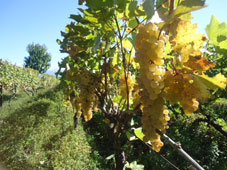
Grape harvest in Kakheti begins with rallies
By Tatia Megeneishvili
Friday, September 11
The Grape Harvest (Rtveli) season was officially opened in Kakheti on September 10 on the background of the rally in Gurjaani region. Winemakers were demanding an increase in the grape price, saying that the grape wholesale price, set by the government, will not cover the costs of their vineyards.
Protesters stated that they wasted more money on the caring process of vineyards and “simply cannot sell the grapes with the existing price.”
The winemakers claim that they will not start the harvest and are going to leave the grapes on the vines.
Founder of the Scientific Research Institute of Horticulture, Viticulture and Wine-making, Davit Tamarashvili approved the steps of the farmers.
“This people wasted over 5, 000 GEL on one hectare of vineyard. With the existing price they cannot have any income. Government needs to set up new methods to support them,” he stated.
According to the National Wine Agency, it will start buying grapes from the farmers in the Dedoplistskaro and Signagi districts on September 10. Also, four wine enterprises located in Dedoplistskaro, Tsnori, Gurjaani and Village Chandari are fully prepared to begin wholesale process of grape harvest.
The agency said that other districts of Kakheti will be gradually engaged in the harvesting process, which will later be followed by opening of new enterprises.
Grape prices on the first day of Rtveli were next: 0.25 GEL for 1 kg of Rkatsiteli and Mtsvane grapes; with added state subsidy of 0.35 GEL, the price will be 0.60 GEL in total. The government will pay 0.60 GEL for 1 kg of Saperavi that will cost 0.75 GEL, subsidy included.
The Head of the National Wine Agency Giorgi Samanishvili recommends winegrowers to squeeze grapes at home.
“Wine enterprises already have wine reserves from the last year to be sold in Russia and Ukraine. Demand on wine has decreased within the country as well. This is why the price of grapes cannot be higher this year,” stated Samanishvili.
It should be noted, that during the harvest of peaches the situation in the country was similar. The government set a low wholesale price and many farmers protested the fact by leaving peaches on the trees.


